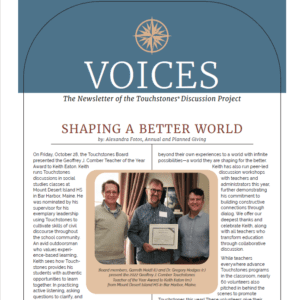By Jenn Macris
Fyodor Dostoyevsky famously wrote that “the degree of civilization in a society can be judged by entering its prisons.” Recently I have been going into the Maryland Correctional Institution for Women (MCI-W) to facilitate their weekly Touchstones discussions. Since joining Touchstones, I have led or participated in many different types of Touchstones groups, but the discussions at MCI-W have been truly eye-opening—perhaps even life-changing. Touchstones brings an element of civilization and humanity to these women that they desire and deserve.
Touchstones has always been motivated to give a voice to those in society who are often not heard due to individual, community, and societal dynamics. Touchstones discussions serve as a platform for these women to reflect on what they truly know, believe, and feel and to remain open and welcoming to what their fellow inmates know, believe and feel— without judgment. This is generally unheard of in a prison setting.
When I entered MCI-W for the first time, I was uneasy. I had never been in a prison. I must have appeared hesitant when going into the prison classroom where the students, women felons, were still seated in their normal rows of seats. As soon as they saw me, however, they moved their desks into a circle, distributed the Touchstones volumes, and asked for the attendance sheet, all without my asking. Quickly, the group was ready; it was clear this activity was important to them. And I felt welcomed with almost no introduction—I was immediately part of this group of caring human beings.
Many of these women will be released and return to their families and communities. The skills they are learning now are helping them develop their sense of dignity and self-worth. Their efforts will yield a great ripple effect well beyond themselves, showing true change can happen. I am also evolving through my experiences in these Touchstones discussions. I am becoming more aware of my incorrect, often unconscious, stereotypes of who are in our prisons and what these women have to offer our society. I feel fortunate to engage with these women and witness their growth, and mine, and that I am given the opportunity to help introduce and foster much-needed civility and humanity in the prison environment.



 Join the
Join the